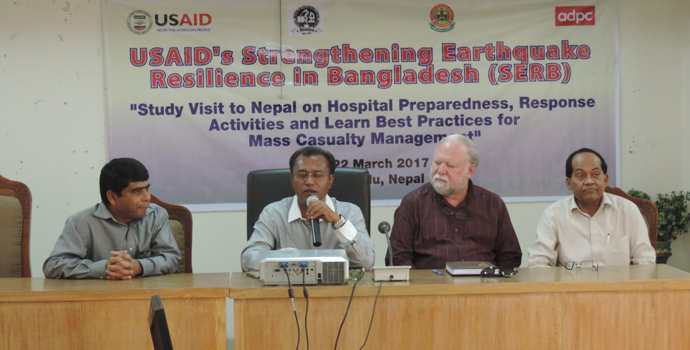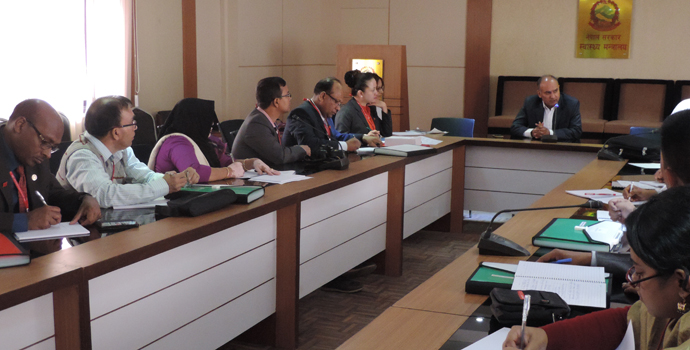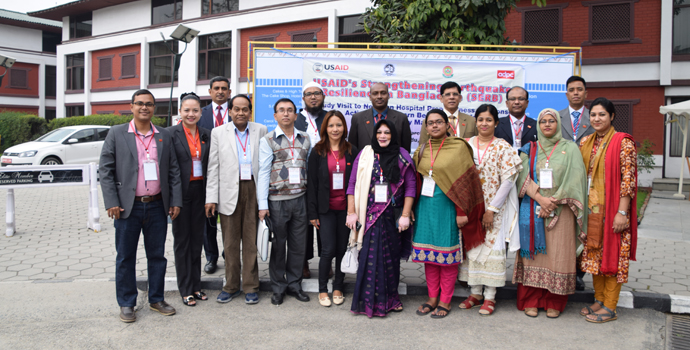- About Us
-
Who we are
-
- Publications
-
- ADPC Academy
-
MediaADPC'S NEWS
Fostering regional cooperation: ADPC hosts study visit to Nepal for Bangladesh government officials on hospital preparedness, response and managing mass casualty incidents Fostering regional cooperation: ADPC hosts study visit to Nepal for Bangladesh government officials on hospital preparedness, response and managing mass casualty incidents
19 - 23 Mar 2017
Kathmandu, Nepal
Asian Disaster Preparedness Center (ADPC) brought outstanding alumni from their Hospital Preparedness for Emergencies (HOPE) courses and government representatives from Bangladesh on a study visit to Kathmandu, Nepal, from 19 – 23 March 2017.
As part of U.S. Agency for International Development's (USAID) through Strengthening Earthquake Resilience in Bangladesh (SERB) program, the study visit aimed to build participants’ capacities on hospital preparedness and response activities and observe related best practices in Nepal. The study visit was a great opportunity for discussions, exchanges and learning about topics of common interest between hospital administrators from Nepal and Bangladesh. It also gave participants the chance to establish a network between hospital administrators, which will help foster future cooperation between Bangladesh and Nepal.
The study visit included meetings and consultations with various government agencies, hospitals/health facility personnel and other stakeholder related to managing emergency health facilities, rescue operations, and allocating resources in disaster affected areas.

USAID officials conducted the Group Orientation Session together with Director NIPSOM (center) and ADPC staff.“The study visit was a great learning opportunity to understand the practical application of hospital preparedness and hospital incident command system (HICS) knowledge in case of a real disaster. I hope that health professionals from different public hospitals will also get the same learning opportunity through study visits like this for awareness raising on the importance of a hospital emergency response plan and its implementation,” said Prof. Dewan Ali Hassan Chowdhury, Head Department of Surgery, Sylhet MAG Osmani Medical College Hospital (SOMCH) in Bangladesh.
During the consultations with different agencies, participants had the opportunity to learn from high ranking officials and hospital authorities who aided in the response after the Nepal Earthquake in April 2015. These first-hand accounts gave participants valuable lessons on how to manage chaotic situations during a crisis and how to provide healthcare, food, shelter, water, and even psychosocial support.

Participants at the presentation of the National Health Emergency Operations Center (NHEOC) of the Nepal Ministry of Health and Population.“We learned how the professionals in Nepal had prepared for their response, which will be helpful for us when we develop our strategy and plan for earthquake preparedness in Bangladesh,” reflected Md. Akram Hossain, Assistant Director, Bangladesh Fire Service and Civil Defence (FSCD).
By the completion of the study visit, participants developed an action plan and committed to implementing it upon returning to Bangladesh to better prepare themselves for future events.
Prof. Dr. Md. Ziaul Islam, PhD., representative from the National Institute of preventive and Social Medicine (NIPSOM), one of ADPC’s partner agencies for the SERB program in Bangladesh, also attended the study visit. He plans “to build the capacity by conducting training on major disasters, especially earthquake, for workers of diverse health organizations; strengthen disaster preparedness, response, rescue, recovery and rehabilitation activities throughout the country and contribute in the renovation of national disaster management policy.”
The study visit was led and coordinated by Ms. Janette Lauza-Ugsang, Acting Chief of Party SERB and PHE Senior Project Manager of ADPC, with support from ADPC Bangladesh and Nepal country teams, Dr. Noor Ahmed, Ms. Subarna Barma and Ms. Chandra Laxmi Hada.
More information on ADPC’s SERB Program
The aim of the SERB program supported by USAID Bangladesh is to increase the capacity of the Government of Bangladesh to respond to and manage natural hazards. To achieve this, the program builds the capacity of hospitals for better preparedness to manage mass casualties and strengthen the capacity of the urban community volunteers. The SERB Program is implemented in partnership with National Institute for Preventive and Social Medicine (NIPSOM), Directorate of Disaster Management (DDM) and Bangladesh Fire Service and Civil Defense (FSCD) of the Government of Bangladesh.
SERB Program covers six earthquake-prone Districts in Bangladesh: Dhaka, Chittagong, Tangail, Mymensingh, Sylhet and Gazipur.

Group photo of USAID SERB study visit participants.Latest NewsRelated Trainings
-